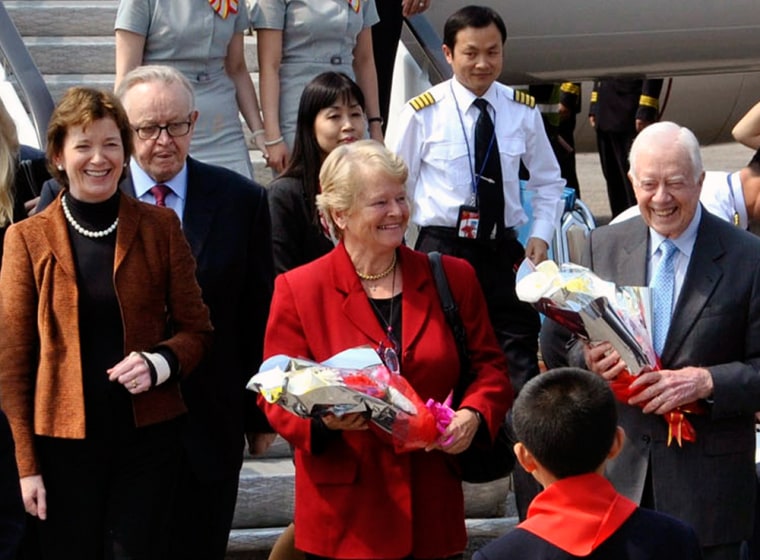Former President Jimmy Carter and three other former state leaders arrived in Pyongyang on Tuesday, hoping to defuse tensions on the divided Korean peninsula and revive long-stalled nuclear talks.
Children presented flowers to Carter, former Finnish President Martti Ahtisaari, former Norwegian Prime Minister Gro Brundtland and former Irish President Mary Robinson at the airport.
The group was also greeted by Vice Foreign Minister Ri Yong Ho, according to Associated Press Television News in Pyongyang.
The "Elders" delegation want to meet North Korean leader Kim Jong Il and his son and heir apparent Kim Jong Un to press for a resumption of dialogue between the two Koreas. They will also discuss ways to help alleviate the North's food shortages.
In a brief story, without comment, the North's KCNA state news agency said the group had arrived by chartered plane.
Carter's visit comes as momentum builds toward a resumption of aid-for-disarmament talks, which the North quit in 2009 but now wants to rejoin.
Mixed prospects
The six-party talks involve the two Koreas, the United States, China, Japan and Russia.
"The outlook for the diplomatic engagement is the best it has been in two years, but the prospects for a satisfactory outcome have never looked worse," said Douglas Paal of the Carnegie Endowment for International Peace in Washington.
Few people believe the secretive North will ever give up its pursuit of nuclear weapons, saying they serve as a deterrent against attack as well as being the ultimate bargaining chip.
"All sides are now preparing propaganda campaigns to portray their stances as more reasonable than those of the other countries involved," Paal wrote on the Carnegie website.
Both Seoul and Washington are skeptical about the North's sincerity about denuclearizing, and have demanded Pyongyang take concrete actions to show it is willing to ditch its nuclear weapons program.
Experts say the North could do this by allowing international nuclear inspectors back into the country.
South Korea's foreign minister played down the Elders' visit, but said he would meet the delegates in Seoul at the end of the week when they conclude their three-day visit to Pyongyang.
"Personally, I don't see why North Korea would send a message through a third party or civilians when various channels for dialogue are open," Foreign Minister Kim Sung-hwan told a news briefing.
Dismal ties between North and South Korea, which have ruined efforts to restart the nuclear talks, will also likely be on the agenda. Animosity has soared between the neighbors since the North allegedly torpedoed a South Korean warship in March 2010, killing 46 sailors.
Pyongyang shelled a South Korean island in November, killing two civilians and two marines. The North late last year also revealed a secret uranium enrichment program that would give it a second way to make nuclear weapons.
South Korea is demanding an apology for the warship sinking and island shelling before allowing deeper talks. North Korea says it wasn't responsible for the ship's destruction and says Seoul provoked the island shelling by staging live fire drills in disputed waters.
'Responsible attitude'
The United States and South Korea want the North "to show a responsible attitude" for last year's two deadly attacks on the peninsula, which spiked tensions to their highest level in years.
The two Koreas are still technically at war, having only signed a truce at the end of the 1950-53 Korean War.
The North denies responsibility for the torpedoing of a South Korean warship last year, and said it shelled Yongpyeong island after South Korea test-fired artillery into its waters.
Nobel Peace prize winner Carter brokered in 1994 a deal that pulled Washington and Pyongyang back from the brink of war over the North's nuclear program. But he said he was not going in as anyone's envoy this week.
"The Elders are not in a position to negotiate, we're not mediators. We're going to learn what we can and share what we find with the leaders with whom we have contact in the future," he said in Beijing on Monday.
Shuttle diplomacy between the six-party envoys has increased in recent weeks, and China's representative Wu Dawei was due in Seoul on Tuesday. Experts say this signals they could be close to a breakthrough.
Analysts say if the North's push for talks do not yield a response it could stage another belligerent act, such as conducting a nuclear or missile test, to try to force Seoul and Washington back to the negotiating table.
Carter and his team, which includes former Irish President Mary Robinson, former Finnish President Martti Ahtisaari and ex-Norwegian Prime Minister Gro Brundtland, will also be looking at the isolated state's food shortages.
More than 6 million people in North Korea urgently need food aid because of substantial falls in domestic production, food imports and international aid, the United Nations said last month.
